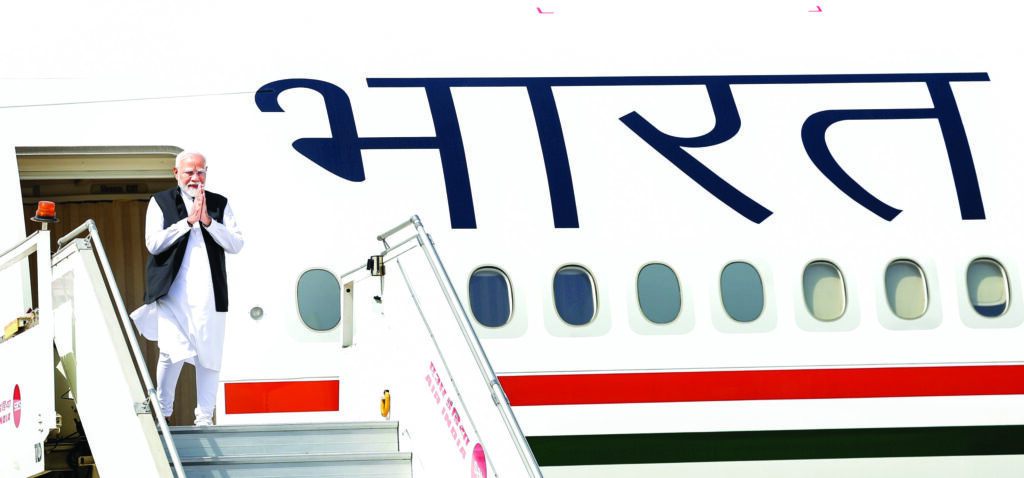Borgo Egnazia (Italy): Amid the Gaza and Ukraine crises, the Prime Minister is in the spotlight, defending the Southern Hemisphere.
As the world celebrates the victory of Indian democracy in the recently concluded elections, Prime Minister Narendra Modi has been in the global spotlight, actively supporting countries of the global south at the G7 summit amid multiple crises, including the escalating conflicts in Ukraine and Gaza.
In his first diplomatic outing since being elected for a third consecutive term, the 73-year-old Modi stood out as a strong and highly respected world leader at the G7 summit in Italy amid a string of lame-duck prime ministers and presidents.
AI and Africa
In just under 24 hours spent at the ultra-luxury resort amidst olive groves, PM Modi displayed his energy and diplomacy by meeting and networking with nearly 10 heads of state, with a message of working in a spirit of global solidarity in a world polarized by crises and conflicts. With his successful G20 presidency underpinning his credentials, PM Modi spoke eloquently about artificial intelligence, Africa, the Mediterranean and the transition to green energy in an outreach session on June 14, putting the interests of the Global South to the forefront. PM Modi's comments on human-centered AI resonated with those of Pope Francis, who spoke at the summit about the ethical and spiritual dimensions of AI. PM Modi asserted that “for technology to succeed, it must be underpinned by a human-centered approach” and shared India's success in leveraging digital technology to deliver public services. PM Modi highlighted the focus of India's mission on the premise of “AI for all,” stressing that the technology “should be aimed at promoting progress and well-being for all.” With this broader objective in mind, the Prime Minister emphasised that India is fostering international collaboration as a founding member of the Global Partnership for AI.
Referring to India's 4A approach for energy transition, Prime Minister Modi assured that India is working towards achieving its net-zero target by 2070, based on “availability, accessibility, affordability and acceptability”. India's Mission LiFE [Lifestyle for Environment]called on communities around the world to join Plant4Mother, a tree-planting campaign he launched on World Environment Day, and make it a mass movement with personal inspiration and global responsibility.
Modi's remarks at the outreach session centred around advancing the aspirations of the Global South and Africa in a forum centred around the twin wars and crises that are ravaging the world.
The $10 trillion dream
With an overarching goal of making India a great power and a $10 trillion economy by 2030, PM Modi held separate bilateral meetings with leaders of G7 countries including Italy, France, UK and Japan. Strengthening economic ties and attracting further investments were the cross-cutting themes in PM Modi's interactions with leaders of these countries. His meeting with Italian Prime Minister Giorgia Maroni, host of the G7 summit, highlighted the growing strategic and economic ties between India and Italy. PM Maroni greeted PM Modi with a 'Namaste' and captivated him with substantive discussions thereafter. Strengthening defence industrial linkages and deepening strategic cooperation were key outcomes of the meeting.
The meeting between PM Modi and Japanese Prime Minister Fumio Kishida focused on accelerating the target of Japanese investment in India to 5 trillion yen between 2022 and 2027, and the India-Japan Industrial Competitiveness Partnership aimed at making India a global manufacturing hub. Economic diplomacy was also at the center of PM Modi's bilateral meetings with UK Chancellor Rishi Sunak and French President Emmanuel Macron. In his meeting with UK Chancellor Rishi Sunak, the main focus was on intensifying negotiations towards concluding a free trade agreement that would pave the way for accelerating India-UK economic ties. The main focus of the Modi-Macron meeting was the next step in the India-France defense partnership under the template of co-production and co-development of the “Make in India” model.
Though the much-awaited bilateral meeting between Prime Minister Modi and US President Joe Biden did not materialise due to time constraints, the two leaders held a productive extraordinary meeting and decided to fast-track key initiatives taken up during Prime Minister Modi's historic visit to Washington about a year ago. The extraordinary meeting was marked by personal warmth and mutual respect, government sources said.
Sources said PM Modi returned to India with a great sense of satisfaction and accomplishment after pitching India as a rising power in the world and a bridge between the Global North and the Global South. PM Modi has made India an integral part of the G7 and the Puglia summit showed that the world's problems and crises cannot be solved without India. India has a big global role to play in addressing these crises, said John Kirton, director of the G7 Research Group.
The G7 summit in Italy culminated in a joint declaration that focused on Ukrainian migration, artificial intelligence, economic security, and financial support for the Indo-Pacific region. The highlight of the summit was the “agreement” to “use proceeds from frozen Russian central bank assets” to bolster $46 billion in aid to Ukraine. “To support Ukraine's current and future needs as it faces a long-term defense against Russia, the G7 will launch a 'Special Revenue Acceleration (ERA) Loan to Ukraine' to provide Ukraine with approximately $50 billion in additional financing by the end of the year,” the joint statement said.
Manish Chand is Editor-in-Chief of India Writes Network and CEO of the Centre for Global India Insights, a think tank focused on world affairs. He is currently in Fasano, Italy, reporting and analysing the G7 Summit and Indian Prime Minister Narendra Modi's visit to Italy.



